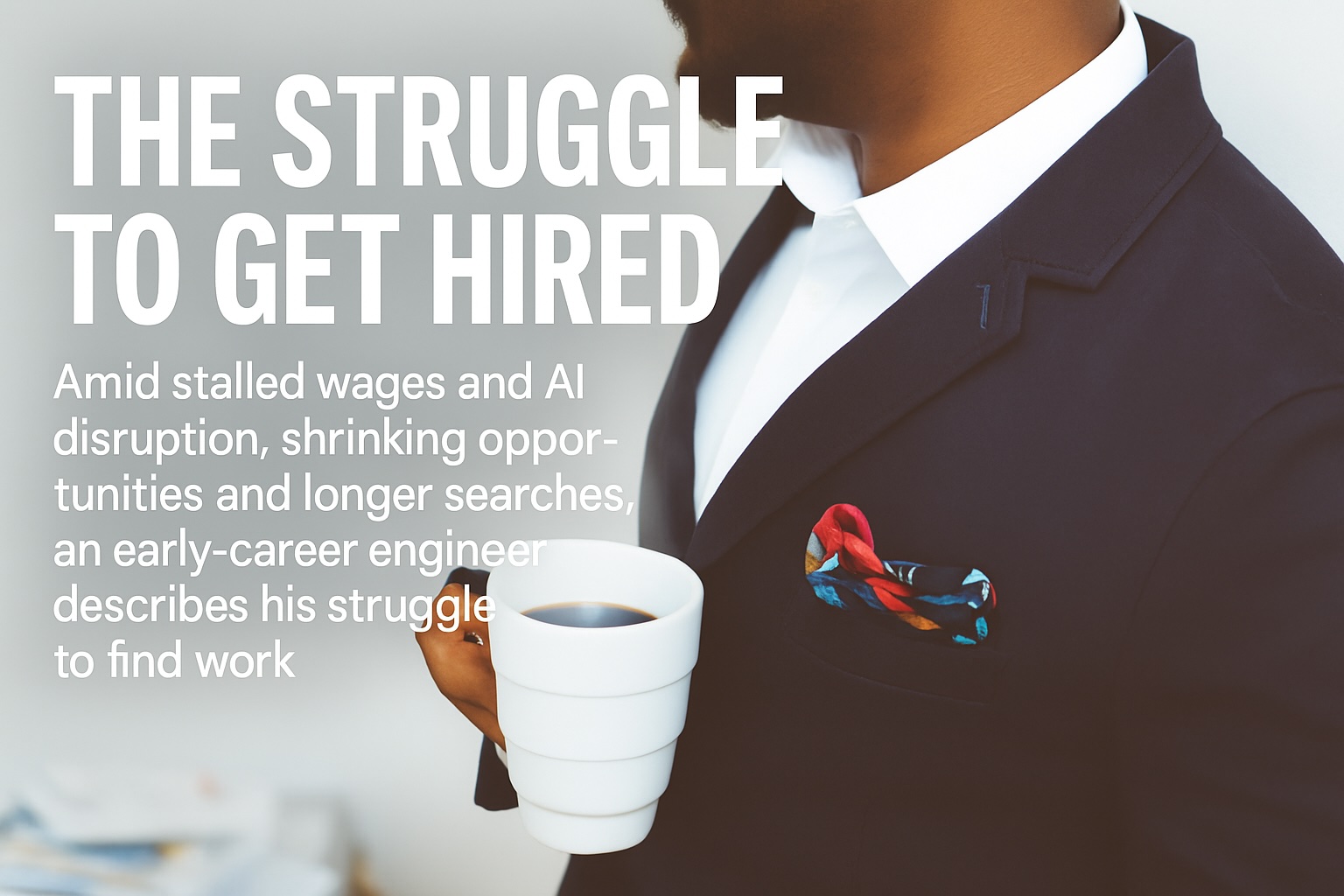Amid stalled wages and AI disruption, shrinking opportunities and longer searches, an early-career engineer describes his struggle to find work.
Editor’s note: This is a first-person account, and the original interview has been edited for clarity and readability.
By Frank White*
After leaving my last role by choice, I’ve been out of work for about five months. Until then, my career path felt relatively straightforward. I entered the workforce in 2022 with a major tech company in San Francisco, where I had first interned as a senior at Columbia University in 2021. That internship led to a full-time offer, and I spent two years there before being laid off. I then joined a Bay Area startup, where I worked for nine months. Since stepping away from that role, I took a short break, and for the past three to four months, I’ve been actively job hunting.
The process has been rough. Submitting applications almost feels like they’re disappearing into a void sometimes; it doesn’t feel like they’re going to a person. It can definitely be demoralizing to send out hundreds and hundreds of job applications and receive no reply. The only real progress I’ve made has come through referrals and networking with people I studied with or worked alongside.
Now more than ever, I’ve found it essential to rely on the network I already have—and to keep building new connections. Cold applications rarely lead to any kind of response anymore.
READ: Fresh grads face a bloodbath, young professionals struggle as U.S. job market tightens (September 6, 2025)
The competition is staggering. I was on LinkedIn the other day, and I was looking at this job that said it had 3,000 applications and in a pool that large, the odds of being noticed feel almost nonexistent, especially with recent graduates.
It feels especially hard for early-career engineers. The overall unemployment rate is stagnated but the unemployment rate for new grads or early career professionals has skyrocketed in the past two to three years. For roles below the senior level, the number of applicants has surged. In software engineering especially, there’s still demand for very senior talent, but the opportunities decrease significantly the further down you go.
When I think about why this shift is happening, I can’t ignore AI. Companies like Amazon have even talked about replacing entry-level engineers with AI agents within a few years, and it’s clear businesses are increasingly relying on AI. At the same time, with startup culture growing, it feels like the dominance of big tech is fading as smaller companies take more of the spotlight.
I studied computer science at Columbia University with a minor in math. Getting my first job back then was a completely different experience. As I mentioned, my first job was the result of an internship with the same company. That meant the last full interview cycle I went through was back when I was applying for internships in the summer of 2021. At the time, I was getting plenty of callbacks and interviews, so by the time I received the offer, I was well-prepared and confident in my interviewing skills.
Companies were also more active in recruiting students at the time. Back then, there was more outreach from companies to students. There were career fairs that would hire students on the spot, or other funnels for students in college to at least have a path to get a job. But these days, it feels like there’s much less of that happening.
I started working as a software engineer full-time in August 2022 after receiving a return offer from my internship. I stayed there for about two years before being laid off. After that, I joined a startup. It was people that I knew. They had an idea. And so, I came on as a founding engineer. But eventually, I left. I wasn’t a big fan of the direction the company was going in. I don’t think that my interest aligned with it to where I could be very effective. So I had to tell them that my heart’s not fully into it. And I didn’t want to waste the company’s resources so I left.
And I don’t regret the decision. I don’t think I would have been in a good place if I continued working there. And I think I wanted to get back to the kind of industry work I was doing as a software engineer at a bigger company. But it’s a completely different job market now.
Still, I’m holding onto hope. I’m optimistic that things will look up. For job seekers, I think it benefits to remain optimistic, even if the situation doesn’t look promising.
* Author’s name, school, and employer changed as he is currently seeking a job.

